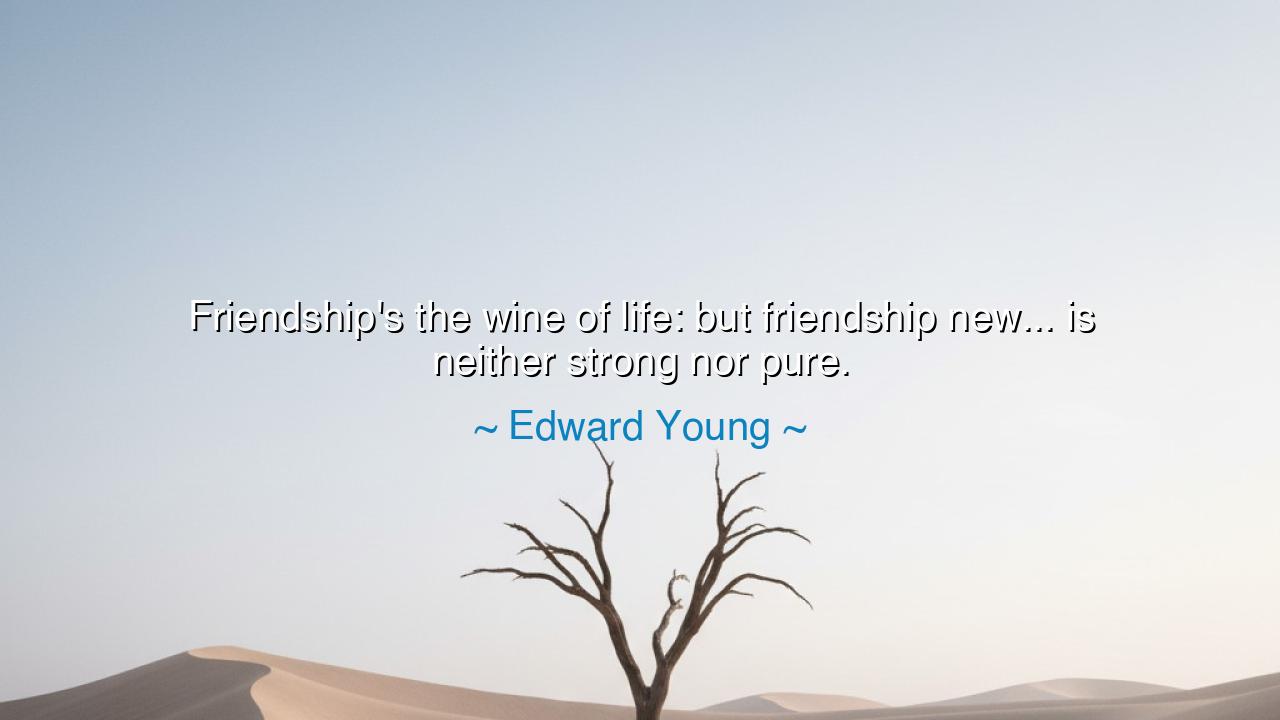
Friendship's the wine of life: but friendship new... is neither






“Friendship’s the wine of life: but friendship new… is neither strong nor pure.” Thus wrote Edward Young, the poet and philosopher of the eighteenth century, whose reflections on mortality and virtue still echo through the corridors of time. In this elegant and haunting phrase, he draws upon an image as old as civilization itself—the wine that grows richer with age—to reveal the true nature of friendship. For Young reminds us that, like wine, friendship must ripen, deepen, and mature before it reaches its finest strength. New friendship may dazzle the senses, sweet and bright, but it lacks the depth and purity that only time, trial, and trust can bestow.
The origin of these words lies in Young’s great moral poem, Night Thoughts, a vast meditation on life, death, and the soul’s pilgrimage through darkness toward understanding. Written after the loss of his wife and dearest friends, the work overflows with a melancholy wisdom born of solitude. It was from this valley of grief that he penned his reflection on friendship—having learned, through sorrow, that companionship is not to be judged by its freshness, but by its endurance. His words carry both reverence and warning: that one should cherish friendship as life’s richest wine, but remember that its finest flavor is drawn not from novelty, but from constancy.
When Young declares that “friendship’s the wine of life,” he speaks to the sacred joy that true companionship brings. Just as wine gladdens the heart and enlivens the spirit, friendship gives sweetness and warmth to our mortal days. It eases the burden of sorrow, doubles the delight of happiness, and turns mere existence into living. But the poet, ever the sage, adds a sober truth: “friendship new… is neither strong nor pure.” For just as new wine is raw and unsettled, so too is a friendship untested by time. It may sparkle with laughter and charm, but it has not yet proven itself in adversity. Only when it has weathered the storms of misunderstanding, jealousy, and distance does friendship become the vintage of the soul—strong in loyalty, pure in affection.
Consider the story of Cicero and Atticus, one of the most celebrated friendships of antiquity. Cicero, the Roman orator, was often beset by the perils of politics, exile, and betrayal. Through it all, Atticus remained steadfast—not for gain, not for glory, but for love of his friend’s soul. Their bond, like the wine Young describes, grew deeper with every trial. When the world turned against Cicero, it was Atticus who wrote to him with words of comfort and truth. When fortune smiled, Atticus rejoiced quietly by his side. Their friendship endured for decades, tested by distance and danger, and in its endurance, it became both strong and pure. In their story, we see the truth of Young’s metaphor: that true friendship is not born in a moment—it is distilled through time.
New friends, though delightful, are still in their infancy. Their affection has not yet been refined by shared suffering or mutual forgiveness. They know only the surface of one another, not the depths. As new wine must rest to lose its bitterness and become clear, so must friendship be given time to reveal its essence. There is nothing false in a new friendship—it is full of potential—but it is also fragile, for it has not yet learned endurance. Only through patience, loyalty, and the passage of days does it acquire the strength that no circumstance can break. Thus, Young’s wisdom is not a dismissal of new bonds, but a call to nurture them slowly, with honesty and care, until they are worthy of being called true.
In a world that moves swiftly, where companionship often flickers and fades like a passing flame, Young’s words are a call to reverence. He teaches us that friendship, like any sacred thing, must not be rushed or treated lightly. It is a trust that deepens over shared joys and sorrows, over forgiveness given and received. To build friendship is to build something eternal—a reflection of the divine harmony that unites all souls. Let us therefore not seek many friends, but few; not those who dazzle in the moment, but those who endure through years. For a single friend, matured by time and proven by trials, is worth more than a hundred fleeting companions.
Let this, then, be the lesson: do not mistake the sweetness of new friendship for its strength, nor its excitement for its truth. Give it time, as one tends to a vineyard—watering it with kindness, pruning it with honesty, and waiting patiently for the harvest. When friendship has ripened, it becomes the wine of life, rich with memory, steady in spirit, and pure in love. And when you share such friendship, count yourself among the blessed, for few are those who drink from so rare and sacred a cup.
For as Edward Young teaches, the greatest treasures are not found in gold or fame, but in the quiet companionship that has withstood the years. Cherish the old friends who have walked through storms beside you; honor the new ones by giving them time to grow. For friendship, like wine, is life’s sweetest gift—and when aged in trust, it becomes not only strong and pure, but eternal.






AAdministratorAdministrator
Welcome, honored guests. Please leave a comment, we will respond soon